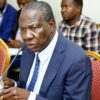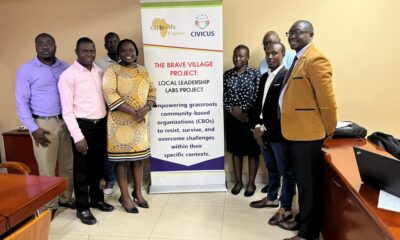News
Gyenaecologist tips voters on choosing MPs

Gyenaecologist and Maternal Health Advocate Dr. Charles Kiggundu
A leading gynaecologist and advocate of women’s reproductive health has challenged the general public especially women to put to task all aspiring Members of Parliament to tell them how they intend to address the unique problems faced by women regarding maternal health.
Dr. Charles Kiggundu, a senior gyenaecologist at Mulago National Referral hospital, says that even though MPs are supposed to be the voices of women, most aspiring MPs have not demonstrated sufficient knowledge about the challenges surrounding reproductive health in Uganda, even though it’s a subject that touches not just the lives of women but men and children as well.
In an interview with The Sunrise Newspaper shortly after a media training session on reproductive health organized by Marie Stopes Uganda, Dr. Kiggundu pointed out that some politicians do not stipulate how they intend to curb the maternal mortality rates in the country yet this is a crucial area for the constituents.
Dr. Kiggundu says these politicians should be the voices of the women and advocate for policies and legislations that will ensure universal access to maternal health.
He adds that parliamentarians should be in position to tell their voters their plans when it comes to the health budget that supports maternal health care to reduce the number of mothers dying due to maternal health complications.
Dr. Kiggundu’s intervention comes at a time when the government is facing the challenge of fullfiling a constitutional court decision that stipulated that maternal health is not a privilege but rather a right for all women and therefore an obligation for the state to meet by the government.
Kiggundu added: “MPs need to also advocate for internationally recognized policies like Sustainable Development Goals (SDGs) especially those in the areas of health and maternal health.
“Political contenders for MP, must bear in mind the fact that a legislator has to ensure that there is universal access to maternal health services because maternal health is no longer a privilege but instead an obligation by the state and therefore legislators must ensure that there is universal access to maternal healthcare as they do their legislation,” said Kiggundu.
Dr. Kiggundu tipped the public to ensure that the MPs commit to holding government accountable on its own pledges regarding budget allocations.
According to Kigundu, budgeting is a role parliamentarians play to ensure that enough resources are put towards areas related to maternal health. However they must hold the government accountable.
He says that it’s not enough to budget because there is also a time of budget cuts.
Dr. Kiggundu cites an example that the Government of Uganda together with other African governments committed to allocate at least 15% of their budgets to the health sector.
He revealed that in Uganda the highest percentage ever allocated to the health budget is 8% which later dropped to 6%.
He observed that a big part of the small health budget goes to Capital development.
Still on budgeting for Maternal Health Dr. Kiggundu wants the next Parliament to focus on stopping the hemorrhage of funds from the sector, leaving the service providers with little or no resources to avail the important service to the vulnerable mothers of this country.
Meanwhile Marie Stopes Uganda (MSUG) Country Manger Dr. Carol Sekimpi reveals that the contraception prevalence rate in Uganda has improved over the years from 15% to 35%.
She explains whereas most women prefer Implants and the injections there other methods like the IUD which have numerous advantages.
Although women in Uganda generally shun the IUD because of the many myths and misconceptions, Sekimpi recommends the IUD since it is none-hormonal, cheap and when removed fertility returns immediately.
“So Marie Stopes Uganda as a technical team is working on providing information and helping women to accept this method but generally speaking, the most popular method is the injection and the Implant,” said Sekimpi.
Comments

























